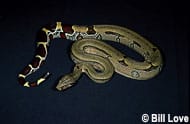Description:
A fast-growing species, young specimens rapidly outgrow small terraria. Plan for the adult with a vertical terrarium at least 3 feet square at the base and 3 or 4 feet high. There should be a minimum of one sturdy climbing branch securely anchored to the floor or wall of the terrarium and able to support the weight of an adult boa. A basking light at the top of the terrarium will be used. Maintain a temperature of 80 to 90 degrees Fahrenheit at all times, with a warmer area in one corner over an undertank heating pad, preferably under a bowl of water large enough to allow the snake to soak. The water should be changed daily. The humidity should not drop below 60 percent. Keep specimens singly—two specimens in the same terrarium may fight. In general, these boas are voracious eaters, taking rodents and birds of appropriate size. Newborn specimens will take adult mice, while adults can take rats. This species grows quickly, reaching 6 feet in just three years. Any hobbyist keeping this species should plan ahead for a large adult. If handled from birth, most specimens remain calm and are not dangerous. Captive-bred specimens generally have brighter colors than wild-caught specimens and are unlikely to have heavy infestations of parasites. All wild-caught specimens should be wormed and if possible checked for inclusion body disease.
Habitat:
Red-tailed boa constrictors are arboreal snakes found in open to dense, humid tropical forests. They sometimes survive near villages, where they may enter homes and buildings.
Range:
Widely found across northern and central South America east of the Andes Mountains. The most colorful specimens generally come from the northwestern part of the range.
Scientific Name: Boa constrictor constrictor
Species Group: boa
Family: Boidae
Size: 6 to 12 feet
Level: intermediate
Weight:
Dangerous: No



